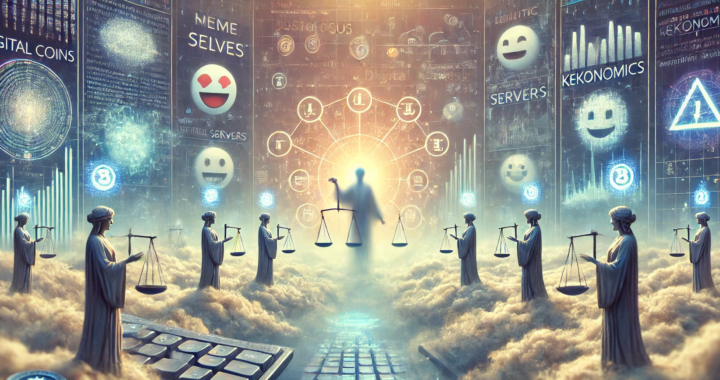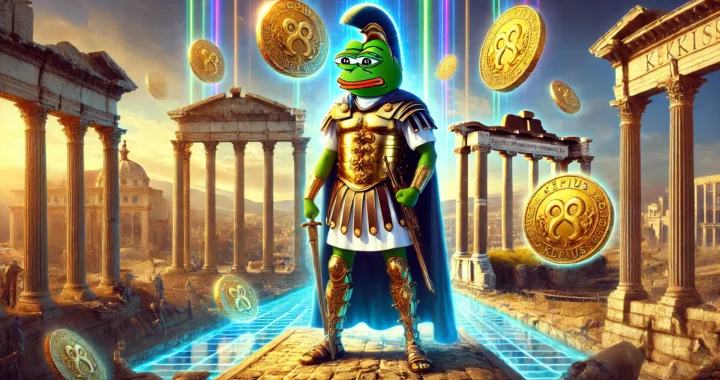Kekonomics operates under a set of laws that, although you might call them absurd, are essential to its functioning. These laws govern attention, value creation, and the very flow of digital economies. They define how memes shape markets, how chaos becomes capital, and how the system persists despite its own contradictions. These principles may seem arbitrary, but in the world of Kekonomics, that’s exactly what gives them power. The first law sets the stage…
1. Meme Magic Is Real
Memes have the power to influence reality. What starts as a joke can have unexpected, real-world consequences.
In a world where traditional power structures often fail to grasp underlying complexities, memes offer an alternative form of communication. They bypass mainstream discourse and penetrate directly into the collective psyche, enabling unexpected changes that existing institutions didn’t foresee.
Examples:
- GameStop Stock Rally (2021): A group of Reddit users on r/WallStreetBets decided to buy massive amounts of GameStop shares, encouraged by memes and internet jokes. This led to a significant surge in the stock price, causing substantial losses for hedge funds that had bet on a decline.
- Bernie Sanders and the Iconic Mittens (2021): A photo of Bernie Sanders at President Biden’s inauguration, sitting with his characteristic mittens, went viral. The ensuing meme generation resulted in merchandise and fundraising efforts that raised tens of thousands of dollars for charities.
— Just meme harder; reality bends if you believe.
2. Chaos Breeds Creativity
Where order falls short, new ideas emerge. The greatest innovations come from the most unpredictable, chaotic circumstances.
Order can lead to conformity and limit creativity. Chaos, on the other hand, provides the freedom to step off the beaten path and explore new possibilities. In this disorder, innovative ideas flourish, and cultural transformations occur that wouldn’t be possible otherwise.
Examples:
- The Explosion of NFTs and Digital Art (2021): The rise of Non-Fungible Tokens (NFTs) created a chaotic market where digital artworks sold for millions. Even seemingly simple or absurd creations, like a pixelated image of a rock (EtherRock), reached astronomical prices.
- Fyre Festival Fiasco (2017): Intended as a luxury music festival on a private island, it ended in complete chaos with insufficient amenities and stranded attendees. Although the event failed, the fiasco itself became a cultural sensation, with memes and documentaries turning the disaster into entertainment and lessons on mismanagement.
— Don’t overplan; just do random stuff until you’re a genius.
3. Irony Is the Highest Form of Truth
The world is so absurd that only irony can truly reflect its nature. What is presented as a joke can reveal deep truths.
In a reality filled with paradoxes and superficialities, direct communication often loses its impact. Irony allows us to explore complex truths without getting entangled in seriousness or dogma. It provides a critical distance that enables us to expose the absurdities of human existence.
Examples:
- Elon Musk’s “420 Funding Secured” Tweet (2018): Musk jokingly tweeted that he was considering taking Tesla private at $420 per share. Though meant humorously, it led to an SEC investigation and had serious financial repercussions, all while amusing an entire generation of internet users.
- Meta’s Misleading Metaverse Presentation (2023): Meta announced that avatars in their Metaverse would finally have legs. However, the “live” demo turned out to be pre-recorded and not representative of the actual technology, leading to mockery and criticism within the tech community.
- Kanye West’s Presidential Campaign (2020): Kanye West launched an apparently absurd presidential campaign. Initially seen as a joke, he actually appeared on ballots in multiple states, blending irony with serious political critique.
— Just kidding, unless? 🤔
4. Everything Is a Meme, and Everyone Is an NPC
In the world of Kekonomics, ideas, culture, and even people can be reduced to memes. Those who don’t see the meme remain NPCs (Non-Player Characters).
In our complex society, information and ideas are often simplified into recognizable formats: memes. These function as the building blocks of modern communication. Those unaware of this memetic dynamic are seen as passive participants—NPCs without real influence or awareness of underlying currents.
Examples:
- “Let’s Go Brandon” Slogan (2021): A misunderstanding at a sporting event led to the slogan “Let’s Go Brandon,” a euphemism for a derogatory chant against President Biden. The meme spread rapidly and became a symbol of political discontent, blending irony and reality.
- NPC TikTok Trend (2023): On TikTok, people started livestreams where they acted like NPCs from video games, repeating phrases and movements in exchange for donations. The absurdity of this trend highlighted how individuals can fall into routines without personal input.
— Press F to pay respects to your NPC life. ✌️
5. The Law of Kek: What Laughs Shall Lead
What initially seems funny can have serious consequences. The power of humor and satire can be both constructive and destructive.
In the information age, serious messages often lose their impact due to their weightiness. Humor, however, has a unique appeal that can unite and mobilize people. What starts with a laugh can grow into a movement with significant influence on social and political structures.
Examples:
- Boaty McBoatface (2016): A public poll to name a new British research vessel resulted in the name “Boaty McBoatface.” Although the main ship wasn’t named that, a submersible was given the name, demonstrating how a joke can have serious outcomes.
- “Deez Nuts” Presidential Candidate (2016): A 15-year-old boy registered the fictitious candidate “Deez Nuts” for the U.S. presidential election. The joke gained national attention, and “Deez Nuts” even polled a few percentage points.
— Just laugh; the world will follow. No pressure.
6. Degenerate to Evolve
Progress sometimes requires dismantling. By disrupting the current structure, you make room for something new and better.
True progress often arises from challenging and dismantling existing systems. This process of “degeneration” is not a step backward but a necessary phase to enable renewal and evolution. It undermines the old to make way for innovative ideas and structures.
Examples:
- OnlyFans’ Content Restriction Reversal (2021): OnlyFans suddenly announced a ban on explicit content, leading to massive uproar since it was the core of their platform. The backlash forced the company to reverse the decision, sparking discussions about the future of digital platforms and content moderation.
- Elon Musk’s Acquisition of Twitter (2022): The chaotic takeover of Twitter by Elon Musk resulted in mass layoffs and changes within the platform. Some saw this as destructive, while others viewed it as a necessary step toward renewal and freedom of speech.
— 🔥 Burn it down, build it worse, repeat until freedom. 🛠️
— De-evolve; it’s like reverse enlightenment. 🦖➡️🚀
7. Posting Is Sowing, Shitposting Is Reaping
Every post is a seed planted in the chaos of the internet. Shitposts are the wild fruits of that chaos, capable of causing unexpected cultural change.
In the digital information ecology, every contribution—no matter how strange or chaotic—has the potential to spark something bigger. Shitposts, often seen as nonsensical or absurd messages, can grow into cultural phenomena with ironic or subversive value through collective interaction and remixing. This demonstrates how unpredictability and collective action can lead to significant cultural shifts.
Examples:
- The Rise of Dogecoin (2021): What started as a joke based on the Doge meme evolved into a full-fledged cryptocurrency. Fueled by online communities and support from influential figures like Elon Musk, Dogecoin reached a market value once thought impossible.
- “Birds Aren’t Real” Movement (2020): A satirical conspiracy theory claiming that birds are actually government drones grew into a movement with merchandise and gatherings. The phenomenon highlighted both the absurdity of some conspiracy theories and the power of internet culture to spread ideas.
- “Storm Area 51” Event (2019): A Facebook event that began as a joke invited people to storm Area 51 to “see them aliens.” It resulted in a massive turnout in the Nevada desert and became a global media event, both online and offline.
— Farm those shitposts; it’s harvest season, baby.
— Your shitpost is my business plan. 📊💩



